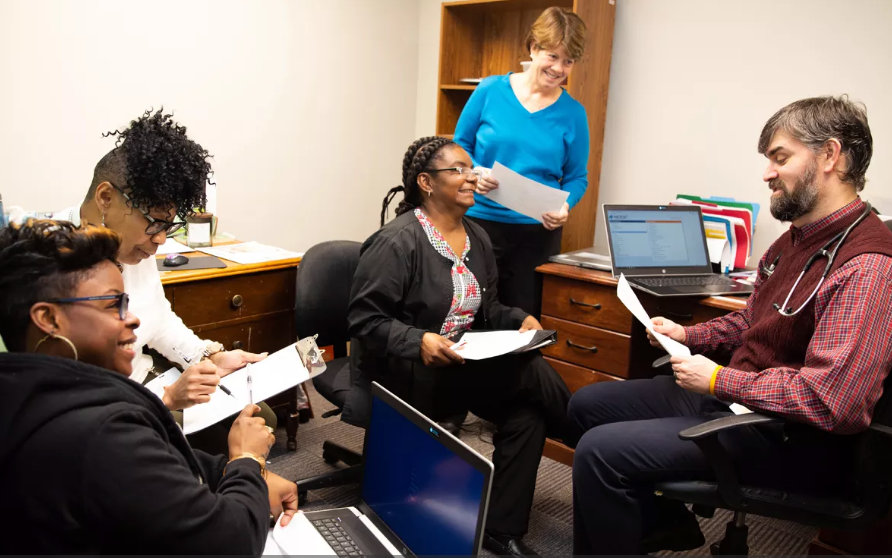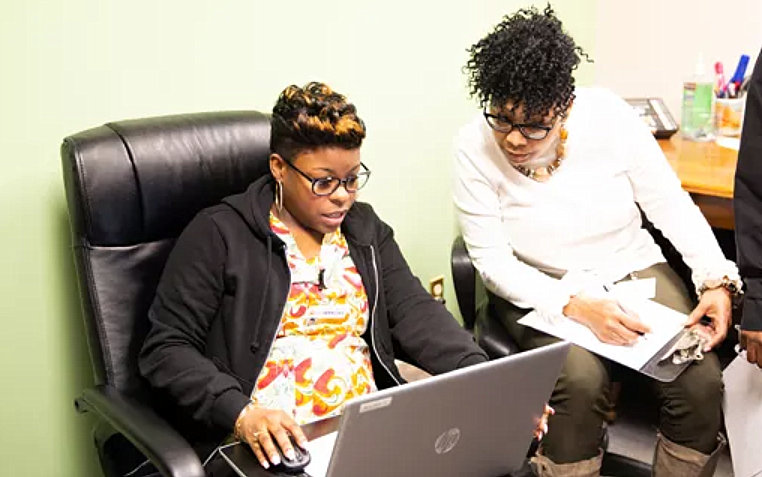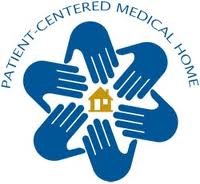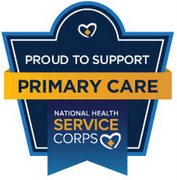
Health center achieves patient-centered milestone
By Robin L. Flanigan – January 28, 2019
Three years ago, before the community health center His Branches partnered with Common Ground Health, this was a typical scenario:
Moments into a patient’s visit, Medical Director Dr. Matthew Mack would realize he didn’t have the MRI results he needed. He’d then dart to the front of the office to find out where they were. A secretary would search for, and ultimately find, them—just in time for the patient’s visit to end.
“There was zero foresight and the stress level was much higher,” he recalls.
The center’s two locations, in the 19th Ward and Beechwood neighborhoods, experienced similar challenges.
From left, Jenai Lawton, medical assistant, Regina Gonzalez, patient advocate, Dorcas N. Green, registered nurse, Sue Swift, quality improvement advisor with Common Ground Health, and Dr. Matthew Mack, M.D., meet in a huddle at His Branches medical center on Jan. 17, 2019.
“It was planned chaos all day long and across the board,” says Sue Swift, who serves as a quality improvement advisor on Common Ground’s practice transformation team. She worked with staff at both locations on providing comprehensive care before, during and after patient visits.
“It sounds simple,” Swift adds, “but it’s transformative for practices and for patients.”
His Branches’ relationship with Swift as a consultant introduced critical strategies and skills to the safety net practice. As a result, the center reduced wait times, stretched follow-up visits from 15 to 20 minutes, improved patient outcomes, and implemented a host of other care enhancements.
Those quality improvements recently helped His Branches earn renewal as a New York Patient-Centered Medical Home, recognition that the practice is using a holistic, patient-centered approach and is committed to continuous improvement. Research shows that practices using the medical home model benefit from lower health care costs, improved patient experience and better health outcomes.
“Sue was firm and gentle, the perfect combination for a leader,” says Dr. Mack. “We’re a grassroots kind of place and there were times we felt overwhelmed and discombobulated with so many details, but she helped us stay grounded.”
Using metrics to track its entire patient population, rather than only focusing on those who show up for appointments, the center has a much broader perspective and greater ability to close gaps in care. It can, for example, see which patients have not shown up for immunizations or lead screenings, or how many with hypertension and diabetes are overdue for a follow-up visit. Staff can then reach out to these individuals, helping to catch medical issues when they are easier and cheaper to treat.
Jenai Lawton, medical assistant and Regina Gonzalez, patient advocate, talk about care they will provide during the day during a meeting at His Branches Medical Center. Common Ground Health assisted His Branches with putting in place team-based care.
Perhaps the biggest impact has come from establishing care teams, each one comprised of a provider, a nurse, and a patient advocate. The teams meet 30 minutes before the first patient appointment to plan out the day with intention. These huddles ease tension for staff and for patients—the majority of whom are uninsured, qualify for Medicaid, or are otherwise vulnerable—especially when emergencies arise.
The care teams also meet every two weeks to improve the way they work together. Staff members take turns leading the meetings to build leadership skills and rapport.
“Communicating up front makes sense,” says Jennifer Wolford, RN, nurse manager. “We’re just more organized and have a better understanding of a patient’s needs before they come in the door.”
Patients have picked up on the care team structure.
“I am noticing an increase in the number of times I hear ‘She’s my nurse,’” notes Wolford. Patients “are recognizing which nurse works with which provider, and they know specifically who they want to talk with. That builds trust over time.”
As patient problems become more complex, it’s important for practices to develop a mindset of continuous improvement. To that end, different project teams meet on a regular basis to discuss outcome measures, patient-centered metrics, and other topics, and the center is initiating focus groups to learn more about what can be done to improve satisfaction and compliance rates.
In the meantime, the center maintains its own focus on moving toward a value-based payment model, which rewards health care providers for improving health outcomes—not only for performing procedures.
Before the center’s partnership with Common Ground, approximately 90 of its income was a fee-for-service payment model. That dropped to 65 percent during the last fiscal year, reflecting the increased rewards to the practice has earned by improving patient populations outcomes.
“We’re shifting that balance very deliberately and happily,” says Dr. Mack. “Not to be prideful about it, but we’ve worked hard to better focus on value-based payment measures. We are really embracing the concept, and want to be a bigger part of the conversation.”







